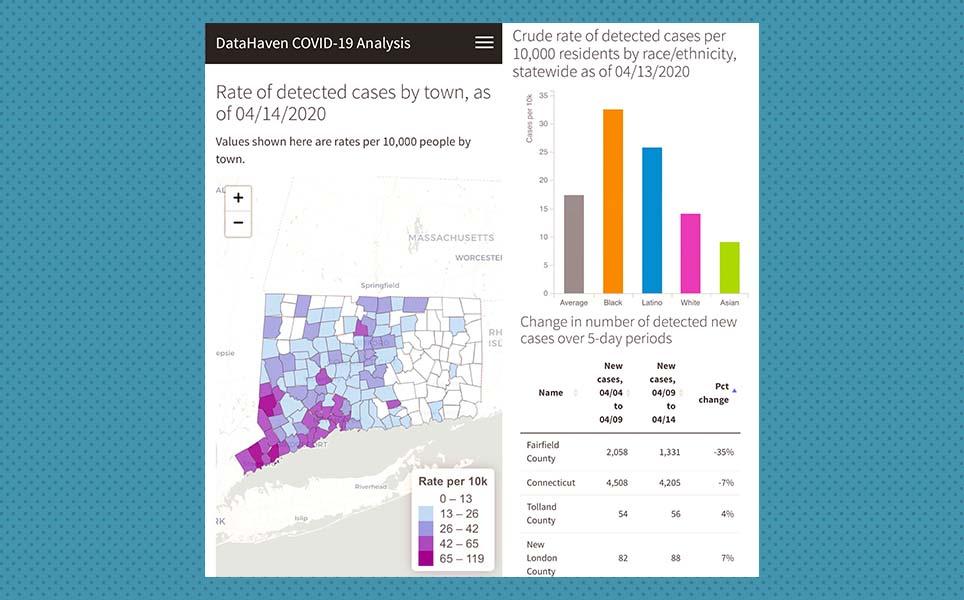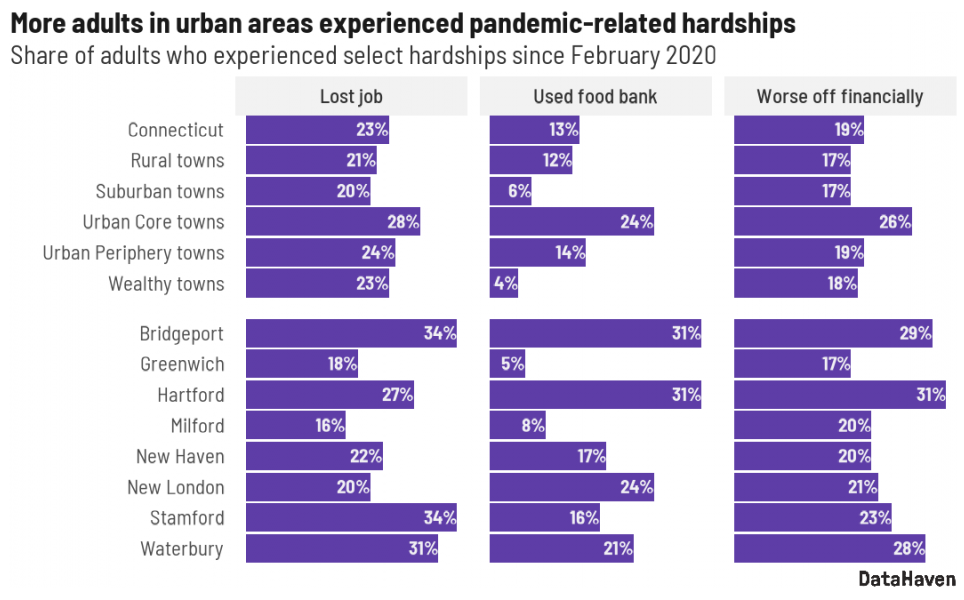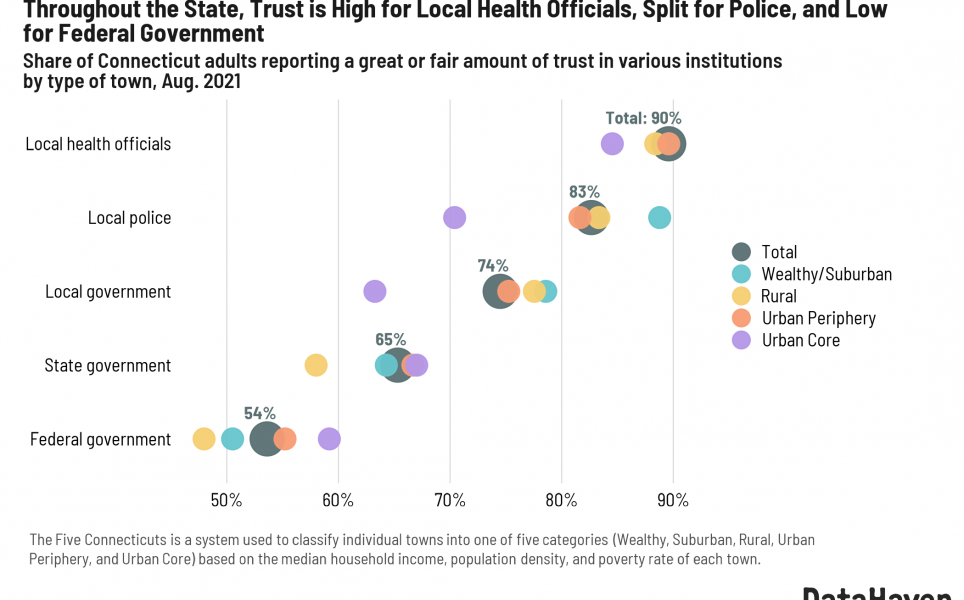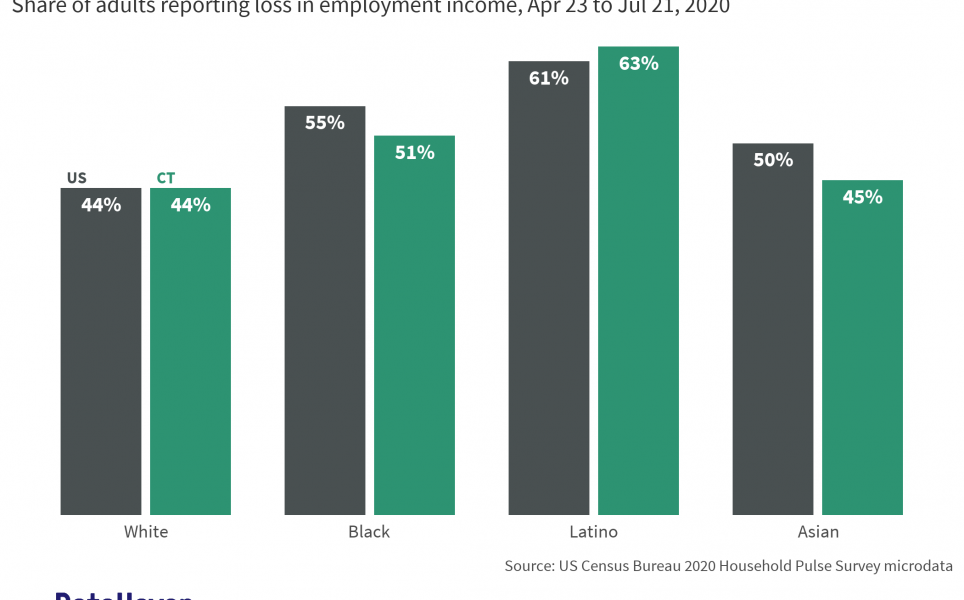This is a summary of press coverage surrounding the release of results from the 2020 DataHaven Community Wellbeing Survey COVID-19 Response Wave.
Click here for the September 16th press release, background information, and data files.
News coverage, and excerpts from each, include:
- Pananjady, K. (2020, September 17). ‘State of Wellbeing’ survey quantifies racial inequities in both health and economy. Connecticut Mirror. https://ctmirror.org/2020/09/17/state-of-wellbeing-survey-quantifies-rac...
"Black and Latino people in the state have not only borne disproportionate loss of life due to COVID-19, but have also been hardest hit financially, according to data released Thursday. The multi-faceted analysis tells a tale of two pandemics as COVID-19 exacerbates existing health and economic inequities.
Among the most striking findings is that Black people are nearly twice as likely to have lost a loved one or friend to the coronavirus as white people. They are also much less likely to feel that their employers are keeping them safe at work. From an economic standpoint, Latinos experienced higher rates of job layoffs and greater housing insecurity.
The data was compiled and released by DataHaven, a New Haven-based nonprofit research group that seeks to inform public policy and analysis.
Some preliminary findings from the release were published last week and referenced in a press briefing by Gov. Ned Lamont. The report showed that a high percentage of Connecticut residents wear masks (89%) and that only 20% of residents would chose not be vaccinated against COVID-19 when a vaccine is made available.
The governor also referenced another finding from the survey — that 87% of state residents believed that their employers were keeping them safe.
But a racial breakdown of this statistic paints a more sobering picture: While 87% of whites and 89% of Latinos surveyed thought their employers had done enough to keep them safe, only 68% of Blacks did. Higher percentages of Black people also reported leaving the house more often for work than whites did, although that number was comparable to the percentage of Latinos who had to leave home to work. [....]"
- Putterman, A. (2020, September 7). Survey: 20% of Connecticut residents wouldn't get vaccinated for COVID-19, strong support for mask-wearing. Hartford Courant.
Click on link above for information.
- Otte, E. (2020, September 17). Latina Leaders in Connecticut Meet to Encourage Women of Color to Run for Local Office. CT Examiner. https://ctexaminer.com/2020/09/17/latina-leaders-in-connecticut-meet-to-...
"[....] According to the U.S. Census Bureau, Latinos make up 16.9 percent of the population in Connecticut. Yet data shows that the Covid-19 pandemic has disproportionately affected these communities.
A recent report from DataHaven shows that 37 percent of Latino adults in Connecticut reported that, since February, at least one adult in their household has lost his or her job, compared to 18 percent of White people and 22 percent of Black people. Twenty-seven percent of Latinos have experienced food insecurity this year, as compared with 9 percent of White people and 22 percent of Black people.
Additionally, Latinos report lower levels of trust in their local police, local government and state government as compared to whites. [....]"
- O'Shaugnessy, T. (2020, September 17). Survey: Majority of Connecticut adults happy despite pandemic; happiness level plummets for poor, minorities. Waterbury Republican-American. https://www.rep-am.com/local/localnews/2020/09/17/survey-majority-of-con...
"A new survey finds 68% of adults in Connecticut report feeling mostly or completely happy despite the pandemic, but happiness varies widely by income.
Among adults earning $100,000 or more, 76% report feeling happy, compared to 54% among those earning less than $30,000, according to the DataHaven Community Wellbeing Survey released Thursday.
The survey also found 20% of all adults report that at least one member of their household has lost their job or been laid off because of the economic fallout from the pandemic. That number jumps to 37% among Latinos and 22% for Blacks. Another 29% of Connecticut adults have had their work hours cut or been placed on temporary furlough.
In the state, 12% of men and 15% of women reported they did not have enough money for food at some point in the last year, a number that was higher among Blacks (22%) and Latinos (27%). [....]"
Since the pandemic, 10% of adults reported lacking enough money for housing, a 2% increase since 2018."
- Rondinone, N. (2020, September 17). Survey: Despite ongoing pandemic, majority in Connecticut remain happy; challenges persist for low-income and minority households. Hartford Courant. https://www.courant.com/coronavirus/hc-news-coronavirus-clb-datahaven-ha...
"A lingering COVID-19 pandemic appears not to have harshly dampened people’s spirits in Connecticut, but challenges persist for some across income level and race, a new sweeping survey from DataHaven shows.
The survey, which accounts for interviews with 1,108 adults in the state from mid-July through mid-August, shines light on the mood of residents faced with months of shutdowns, restrictions and a dramatic and speedy readjustment to a new normal. [....]"
- Hamad, M. (2020, September 13). State’s Black leaders and pastors react with dismay to suggestion by Connecticut governor that Black churches should help lead support for COVID-19 vaccine. Hartford Courant. https://www.courant.com/coronavirus/hc-news-coronavirus-lamont-working-w...
"[....]As Connecticut and other states race to develop a COVID-19 vaccine, distrust in any government intervention into their physical well-being — stemming largely from the Tuskegee Syphilis Study, which ended in 1972, and other historical examples — remains a powerful force in the Black community.
In his remarks about vaccinations and people of color last week, Lamont cited a recent study that showed African-Americans and Hispanics were more likely to get tested for COVID-19 than whites, but less willing to be vaccinated. A recent Siena College Research Institute/DataHaven survey of Connecticut adults showed that 38% of Black respondents said they would get vaccinated against COVID-19, compared to 67% of whites.[....]"
- Borden Herve, H. (2020, September 21). Exclusive: GMW Interviews Gov. Lamont in Wilton. Good Morning Wilton. https://goodmorningwilton.com/exclusive-gmw-interviews-gov-lamont-in-wil...
"[....]Haskell: Yes. So really interesting numbers came out of DataHaven this morning. You may have seen them: only 6% of Connecticut residents say that they sought a test and weren’t able to find one, but the better statistic is that one-in-four Connecticut residents has already been tested, which is pretty astonishing. [....]
Going back to that DataHaven survey that came out today, 90% of Connecticut residents trust public health officials, that’s way higher than those who trust state officials and those who trust local officials. The last thing you want is somebody like a legislator making a decision about what’s allowed and what’s not. It should be epidemiologists leading the way. And Connecticut has put public health officials front and center rather than politics. [....]"
- La Voz Hispana. (2020, September 20). Encuesta refleja las desigualdades raciales tanto en la salud como en la economia en Connecticut. https://lavozhispanact.com/2020/09/20/datanewhaven-encuesta-refleja-las-...
"[....]Los datos fueron compilados y publicados por DataHaven, un grupo de investigación sin fines de lucro con sede en New Haven que busca informar las políticas públicas y el análisis.
Algunos hallazgos preliminares del comunicado se publicaron la semana pasada y el gobernador Ned Lamont hizo referencia a ellos en una conferencia de prensa. El informe mostró que un alto porcentaje de los residentes de Connecticut usan máscaras (89%) y que solo el 20% de los residentes elegirían no vacunarse contra el COVID-19 cuando una vacuna esté disponible.
El gobernador también hizo referencia a otro hallazgo de la encuesta: que el 87% de los residentes del estado creían que sus empleadores los mantenían seguros.
Pero un desglose racial de esta estadística muestra un panorama más aleccionador: mientras que el 87% de los blancos y el 89% de los latinos encuestados pensaban que sus empleadores habían hecho lo suficiente para mantenerlos a salvo, solo el 68% de los negros lo hacía. Los porcentajes más altos de negros también informaron salir de la casa con más frecuencia para trabajar que los blancos, aunque ese número era comparable al porcentaje de latinos que tenían que salir de casa para trabajar. [....]"
- Rabe Thomas, J. (2020, October 5). Motel-dwellers aren’t considered ‘homeless enough’ to warrant state help. Connecticut Mirror. https://ctmirror.org/2020/10/05/motel-dwellers-in-ct-arent-considered-ho...
"[....]Housing crises also disproportionately impact Black and Hispanic residents, a recent survey of a representative sample of state residents from DataHaven shows. [....]"
- Rondinone, N. (2020, October 9). Mayors neighboring Hartford launch weekly distribution to address regional food insecurity. Hartford Courant. https://www.courant.com/news/connecticut/hc-news-bloomfield-food-insecur...
"[....]A recent sweeping survey from DataHaven showed that 9% of Connecticut residents were experiencing some form of food insecurity during the COVID-19 pandemic.[....]"
- Mousavizadeh, P. (2020, September 27). DataHaven survey reveals racial disparities in COVID-19 experience. Yale Daily News. https://yaledailynews.com/blog/2020/09/27/datahaven-survey-reveals-racia...
"[....]The survey also corroborated the high rates of infection and mortality within the state’s Black and Latino communities. Among these respondents, 42 percent and 46 percent, respectively, reported having a close friend or family member test positive for COVID-19. This number fell to 30 percent among white respondents. A death disparity also exists along racial lines, with 12 percent of white respondents reporting the loss of a close friend or family member, compared to 15 percent of Latino respondents and 20 percent of Black respondents.
The higher death rates among Blacks and Latinos corresponds with increased caution among those populations, with both groups reporting higher rates of mask-wearing and concern over exposure to the virus. Ninety-five percent of Blacks and 82 percent of Latinos reported mask-wearing, compared to 80 percent of whites. Sixty-one percent of Black respondents and 24 percent of white respondents reported being ‘very concerned’ about the virus.
Many of the survey’s respondents expressed a lack of trust in the federal government’s ability to look out for the best interests of their family. Only 43 percent of respondents reported a “great deal” or a “fair amount” of trust. However, trust in local and state governments has remained much higher, both at 72 percent.
DataHaven was founded in 1992."
- 2020, October 23. With food insecurity an ongoing issue in Connecticut, Foodshare will continue its drive-thru site at Rentschler Field through November, Hartford Courant, https://www.courant.com/news/connecticut/hc-news-foodshare-distribution-...
Television, radio, and other coverage
SSKP Plans for Rise in Thanksgiving Need https://www.zip06.com/news/20201118/sskp-plans-for-rise-in-thanksgiving-...
A"s many of us are tempering our disappointment and adjusting Thanksgiving plans as COVID cases rise in the state and across the country, the number of people unable to afford everyday groceries is bound to grow. Locally, Shoreline Soup Kitchens & Pantries (SSKP) is preparing to do its part to help.
According a September report by DataHaven based on its statewide Community Wellbeing Survey, 20 percent of adults reported that since February 2020, at least one adult in their household had been laid off. Twelve percent of men and 15 percent of women said they’d experienced food insecurity, meaning not having enough money for food for themselves and/or their families at some point in 2020."
Between the Lines: https://btlonline.org/community-survey-finds-racial-disparities-on-coron...
"Connecticut was one of the hardest hit states in America during the early days of the coronavirus pandemic, mostly because of its proximity to New York, which has the highest COVID-19 death toll in the nation. As in other states, Black and Latinx residents as well as nursing home residents were disproportionately affected by the virus. However, by June, the numbers of infections and deaths significantly decreased, and the state started cautiously to open up.
DataHaven is a nonprofit Connecticut organization that gathers and interprets data which supplements information collected by federal, state and local governments and agencies. The group seeks to capture more local level data that often isn’t represented in other surveys, with the goal of discovering what people are most concerned about that determines their health, happiness, sense of community and overall well-being.
In August 2020, DataHaven conducted a scientific, random survey of 1,100 adults in the state, asking people about their experiences around the COVID-19 pandemic. Between The Lines’ Melinda Tuhus spoke with Mark Abraham, executive director of DataHaven, about some of the survey’s important findings, how that data is being used, and why he believes other states across the U.S. could benefit from collecting similar data."
NEPM: https://www.nepm.org/post/black-church-leaders-react-covid-19-vaccine-co...
NBC Connecticut: https://www.nbcconnecticut.com/news/local/demographics-may-determine-how...
Hartford Foundation for Public Giving: https://www.hfpg.org/what-we-do/new-and-noteworthy/new-datahaven-survey-...
WNPR: https://archive.org/details/WNPR_90_5_FM_20200917_220000
Community Foundation for Greater New Haven: https://www.cfgnh.org/articles/measuring-the-impact-of-covid-19









